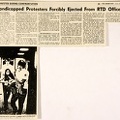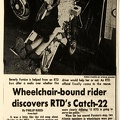Rocky Mountain News Tues., Nov. 6, 1979, Denver, Colo
Photo by Steve Groer, News: A woman in a parka stands, smiling, holding the push handles of another woman's wheelchair. The woman in the wheelchair is facing the camera and smiling, eyes closed, a polite face. She's about eye level to the woman standing behind her because she is on a lift getting into a van.
Caption reads: Pam Mellon helps Sonja Kerr into her van at Atlantis.
[Headline] For some, just getting to job is an obstacle
EDITOR'S NOTE‘: Nearly three fourths of Denver's 700,000-plus commuters drive to work alone by car. This is the latest in a series of stories about those who don't.
By JERRY BROWN
News Staff
Paul and Jan Stewart almost lost their jobs with a local life insurance company after someone stole their car three weeks ago, leaving them with no way to get to work.
Attorney Les Berkowitz owns a specially equipped car and hires a driver for his commuting and work-related travel. He estimates the special arrangements add $350 to his monthly commuting expenses.
Sonja Kerr lives 3 1/2 blocks from the stop where she catches her bus to work. But she has to travel an extra two blocks to get there because of obstacles along the way.
Mel Conrardy shells out $11 for each of his thrice-weekly Amb-O-cab trips to and from work.
For the Stewarts, Berkowitz, Kerr and Conrardy, physical handicaps complicate their efforts to get to and from work — and restrict their commuting options.
There‘s just no transportation for the handicapped if you don't have your own vehicle,” said Jan Stewart, whose husband is a paraplegic.
As a result, Mrs. Stewart said, she and her husband "were in pretty desperate straits" when their car was stolen.
"We don't have any money," she said. “We couldn't rent a car." Taking a bus to work was out of the question, she said, because they don't live close enough to the bus routes on which service for the handicapped is provided, and regular buses aren't equipped to handle Mr. Stewart’s wheelchair. And Amb-0-Cab, which provides door-to-door pick up and delivery service for the handicapped, was too expensive - $17 per round trip.
The state Commission on the Disabled provide the Stewarts with transportation to work for two weeks.
“They were very nice, but it was helter-skelter," Mrs. Stewart said. “They only have one driver and one van. Some mornings they would get us there (work) at 9 a.m., sometimes at 10:30."
That didn't make their employer too happy, Mrs. Stewart said. Particularly since the Stewarts were supposed to be at work by 8 a.m.
And the commission's driver quit at 4:30 p.m., leaving the Stewarts without transportation home.
They turned to “friends, my boss and anybody else kind enough to give us a ride," Mrs Stewart said.
“There were a lot of tears, a lot of frustration and a lot of worry" until they scraped together the money to buy an old used car, she said.
The transportation problems of the physically handicapped are "all easily solvable if all you have is money," said Berkowitz, who maintains an active law practice despite being confined to a wheelchair and having only limited use of his arms “Unfortunately, I don't have that much."
“Transportation is a difficult and an expensive proposition," he added. “But regardless of the negatives, the handicapped do what they have to do. It's not an insurmountable problem. If someone wants to do it, they can do it."
But others within the handicapped community say the lack of cheap, dependable transportation for the handicapped prevents many of the estimated 6,000 to 8,000 Denver area residents confined to wheelchairs from being able to work.
RTD offers limited service for the handicapped — three fixed routes and door-to-door service by subscription only — but doesn't expect to make its regular bus service accessible to the handicapped until 1982.
Accessible bus service will enable many handicapped persons to find jobs who simply have no way to get to work today, according to spokesmen for the Atlantis Community, which has led the fight for accessible buses in Denver.
Kerr, who works for Atlantis, uses RTD’s existing fixed-route service for the handicapped to get to work several days a week.
She also owns a lift-equipped van — bought for her by her uncle — and sometimes rides to work in it with her roommate who drives. Kerr’s roommate plans to move, however, and Kerr said she doesn't think her reflexes are good enough for her to drive the van herself in Denver traffic.
By trial and error, Kerr has found a route between her home and her bus stop.
But she can't ride the bus in bad weather or when there is snow or ice on the ground. And if she misses her bus -— or fails to make a transfer connection downtown -- she has to wait two hours for the next bus.
Conrardy also works at Atlantis, three days a week.
But he lives with his mother and doesn't work to support himself, so the $11-a-day commuting expenses are something he can live with.
“lt gives me something to do, Conrardy said of his part-time duties for Atlantis.
- Created on
- Wednesday 10 July 2013
- Posted on
- Tuesday 10 May 2016
- Tags
- accessible van, Ambo-cab, Atlantis Community, cost, environment, inaccessible, Les Berkowitz, Mel Conrardy, Pam Mellon, Paul and Jan Stewart, ridership, Sonja Kerr, weather, work
- Albums
- Visits
- 3129
- Rating score
- no rate
- Rate this photo


0 comments